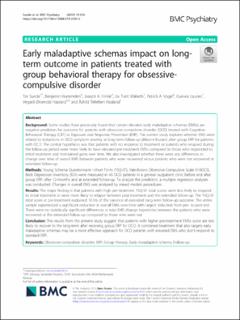Metacognitions and obsessive beliefs in obsessive-compulsive disorder: A study of within- and between-person effects on long-term outcome
Sunde, Tor; Johnson, Sverre Urnes; Himle, Joseph A.; Bertelsen, Thomas Bjerregaard; Haaland, Vegard Øksendal; Vogel, Patrick A.; Walseth, Liv Tveit; Håland, Åshild Tellefsen
Peer reviewed, Journal article
Published version
Permanent lenke
https://hdl.handle.net/11250/3038727Utgivelsesdato
2021Metadata
Vis full innførselSamlinger
- Institutt for psykologi [2970]
- Publikasjoner fra CRIStin - NTNU [37703]
Sammendrag
Background
This study extends previous research by exploring whether changes in obsessive beliefs and metacognitions that were associated with changes in obsessive–compulsive disorder (OCD) symptom severity over the course of group behavioral treatment were maintained at long-term follow-up.
Methods
Forty patients with a primary diagnosis of OCD participated. The between- and within-person effects were investigated with multilevel longitudinal models. Predictor variables were obsessive beliefs and metacognitions.
Results
Across the study period, with a mean 8-year follow-up, obsessive and metacognitive beliefs significantly declined. There were significant between-person effects for metacognition and obsessive beliefs on OCD symptom severity. When the overlap between the obsessive belief factors was controlled for, only changes in metacognitions emerged as an independent predictor of OCD symptom severity. A further analysis revealed that metacognitive beliefs regarding the need to control thoughts made a separate contribution at both the between- and within-person levels.
Conclusions
The results indicate that decreases in metacognitive beliefs during OCD treatment can also have important long-term consequences.

